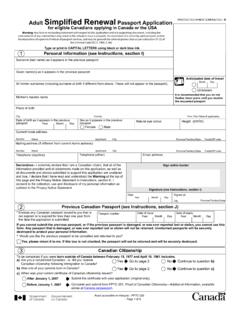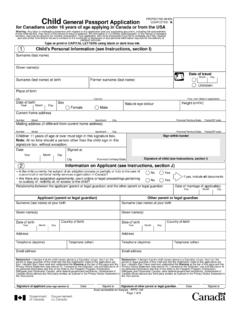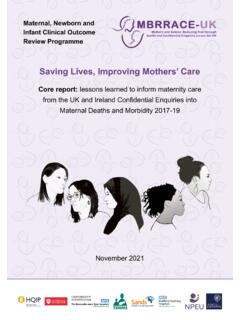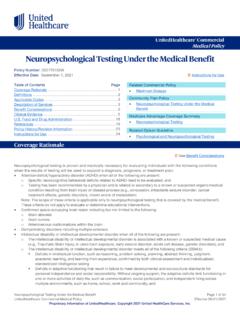Transcription of An Advisory Committee Statement (ACS) National Advisory ...
1 0 | RECOMMENDATION ON THE USE OF PFIZER-BIONTECH IN CHILDREN 5-11 YEARS OF AGE An Advisory Committee Statement (ACS) National Advisory Committee on Immunization (NACI) Recommendation on the use of the Pfizer-BioNTech COVID-19 vaccine (10 mcg) in children 5-11 years of age Published: November 19, 2021 1 | RECOMMENDATION ON THE USE OF PFIZER-BIONTECH IN CHILDREN 5-11 YEARS OF AGE PREAMBLE The National Advisory Committee on Immunization (NACI) is an External Advisory Body that provides the Public Health Agency of Canada (PHAC) with independent, ongoing and timely medical, scientific, and public health advice in response to questions from PHAC relating to immunization. In addition to burden of disease and vaccine characteristics, PHAC has expanded the mandate of NACI to include the systematic consideration of programmatic factors in developing evidence-based recommendations to facilitate timely decision-making for publicly funded vaccine programs at provincial and territorial levels.
2 The additional factors to be systematically considered by NACI include: economics, ethics, equity, feasibility, and acceptability. Not all NACI Statements will require in-depth analyses of all programmatic factors. While systematic consideration of programmatic factors will be conducted using evidence-informed tools to identify distinct issues that could impact decision-making for recommendation development, only distinct issues identified as being specific to the vaccine or vaccine-preventable disease will be included. This Statement contains NACI s independent advice and recommendations, which are based upon the best current available scientific knowledge. This document is being disseminated for information purposes. People administering the vaccine should also be aware of the contents of the relevant product monograph.
3 Recommendations for use and other information set out herein may differ from that set out in the product monographs of the Canadian manufacturers of the vaccines. Manufacturer(s) have sought approval of the vaccines and provided evidence as to its safety and efficacy only when it is used in accordance with the product monographs. NACI members and liaison members conduct themselves within the context of PHAC s Policy on Conflict of Interest, including yearly declaration of potential conflict of interest. 2 | RECOMMENDATION ON THE USE OF PFIZER-BIONTECH IN CHILDREN 5-11 YEARS OF AGE BACKGROUND The Pfizer-BioNTech (Comirnaty) mRNA COVID-19 vaccine is the first COVID-19 vaccine authorized in Canada for use in pediatric populations under the age of 12 years.
4 Pfizer-BioNTech [10 microgram (mcg) dose] was approved for children 5-11 years of age on November 19, 2021. The Pfizer-BioNTech (Comirnaty) COVID-19 vaccine has been previously authorized by Health Canada as follows: December 9, 2020 for individuals 16 years of age and over under an Interim Order using a 30 mcg dose May 18, 2021 for individuals 12 to 15 years of age under an Interim Order using a 30 mcg dose September 16, 2021 for individuals 12 years of age and over as a full authorization under the name Comirnaty using a 30 mcg dose On May 18, 2021, following Health Canada authorization of the Pfizer-BioNTech vaccine (30 mcg dose) for individuals 12 to 15 years of age under the Interim Order, NACI recommended the use of the vaccine in adolescents (Strong NACI Recommendation) based on a review of available evidence including additional clinical trial results in the adolescent population.
5 On August 27, 2021, Health Canada expanded the Interim Order authorization for the Moderna (SpikeVax) COVID-19 vaccine to also include adolescents 12 to 17 years of age. That same day, NACI issued updated guidance on the use of mRNA COVID-19 vaccines in adolescents, incorporating additional evidence including clinical data on the efficacy, safety, and immunogenicity of the Moderna COVID-19 vaccine in adolescents as well as post-market safety and effectiveness reports on both mRNA COVID-19 vaccines. Subsequently, Moderna received full authorization on September 16, 2021 for individuals 12 years of age and over under the name Spikevax. For further information on the use of the Pfizer-BioNTech vaccine in individuals 12 years of age and older, please refer to NACI's Recommendations on the use of COVID-19 vaccines and NACI s Recommendation on the use of mRNA COVID-19 vaccines in adolescents 12 to 17 years of age.
6 NACI s recommendations are aligned with the following goals of the Canadian COVID-19 Immunization Program, updated in October, 2021: i) to enable as many Canadians as possible to be immunized as quickly as possible against COVID-19, while ensuring that high risk populations be prioritized; ii) minimize serious illness and overall deaths while preserving health system capacity; and iii) reduce transmission to protect high risk populations. 3 | RECOMMENDATION ON THE USE OF PFIZER-BIONTECH IN CHILDREN 5-11 YEARS OF AGE METHODS On October 26, 2021 and November 2, 2021, NACI reviewed the available evidence on the use of the Pfizer-BioNTech COVID-19 vaccine (10 mcg dose) in children 5-11 years of age (including manufacturer s clinical data in the regulatory submission to Health Canada, modeling projections on the impact of a pediatric vaccine program, and post-market safety data for the 30 mcg dose in older age groups).
7 Ethical considerations related to COVID-19 vaccination in pediatric populations were discussed with the Public Health Ethics Consultative Group (PHECG) on May 3, 2021, July 6, 2021 and September 21, 2021. The Canadian Immunization Committee (CIC) provided feedback on key policy questions to ensure alignment with program needs on October 21, 2021. NACI approved their recommendations on the use of mRNA COVID-19 vaccines in children 5-11 years of age on November 11, 2021. Details of NACI's evidence-informed recommendation development process can be found elsewhere (1, 2). SUMMARY OF EVIDENCE COVID-19 burden of disease in children Children 5-11 years of age generally present with mild or asymptomatic SARS-CoV-2 infection. Among the 12 jurisdictions currently reporting detailed age data to PHAC, severe outcomes from COVID-19 such as hospitalization and death are very infrequent in children, occurring in < and < of confirmed SARS-CoV-2 infections in children aged 5-11 years.
8 As of November 09, 2021, children aged 5-11 years represent of confirmed SARS-CoV-2 infections, of COVID-19 associated hospitalizations, of COVID-19 associated ICU admissions, and of COVID-19 deaths in Canada (3). Persons 12 years of age and older have been eligible to receive COVID-19 vaccines since at least May 2021, depending on age, and recently children 5-11 years of age have represented the population with the highest incidence of confirmed SARS-CoV-2 infection, although hospitalization rates in this age group have remained low during the fourth wave of the pandemic. While the exact prevalence of SARS-CoV-2 seropositivity among children aged 5-11 years is unknown, seroprevalence estimates in children from studies based in Quebec and British Columbia suggest case-level data is likely an underestimate of infection in this age group (4).
9 Children and adolescents are at risk of multisystem inflammatory syndrome in children (MIS-C) following infection with SARS-CoV-2 (5). In these age groups, MIS-C is a serious, though uncommon, condition. MIS-C is more frequently reported in males and members of racialized groups or populations, with infrequent comorbidities reported aside from obesity (6, 7). A large international cohort study on children with COVID-19 estimated MIS-C to affect between of all diagnosed pediatric COVID-19 patients and between of hospitalized 4 | RECOMMENDATION ON THE USE OF PFIZER-BIONTECH IN CHILDREN 5-11 YEARS OF AGE pediatric COVID-19 patients (8). As of October 16, 2021, 272 cases of MIS-C in individuals 0-19 years of age have been reported in Canada (9).
10 Of these nationally reported cases, over half (59%) were in males, and 40% of cases occurred in children aged 5-11 years, with a median age of 6 years (range: 1 week to 18 years), and 40% of cases occurred in children aged 5 to 11 years. The majority of MIS-C cases in Canada have fully recovered with medical intervention, with no MIS-C associated deaths (9). Myocarditis can also occur as a complication of SARS-CoV-2 infection, including [very rarely] in children (10). While evidence is limited in pediatric populations, children may also be at risk of a post-COVID-19 condition ( , long COVID or post acute COVID-19 syndrome (11)). However, current evidence suggests the risk is lower in children compared to older age groups (12, 13). Children are also at risk of collateral harms of the COVID-19 pandemic.















